Are you thinking about adding a Bernese Mountain Dog or St Bernard Dog to your family?
If so, you’ll want to make sure you choose the right one! In this ultimate comparison guide, we’ll break down everything you need to know about these two breeds.
Keep reading to learn more!
Bernese Mountain Dog vs St Bernard Dog: Breeding History
The Bernese Mountain dog is a relatively new breed, having been developed in the Swiss Alps in the late 1800s.
They were originally bred to be working dogs and were used for tasks such as pulling carts and herding cattle.
The breed was nearly wiped-out during World War II but has since been revived and is now a popular pet in many parts of the world.
The St. Bernard is an even older breed, dating back to the 1600s. Like the Bernese Mountain dog, they were originally bred as working dogs in the Swiss Alps. They too were used for tasks such as cart-pulling and herding. However, they were also used as rescue dogs in the treacherous Mountain conditions.
Today, both breeds are popular pets, although the St. Bernard is more well-known. This is largely due to its starring role in movies like Beethoven and Cujo.
Size
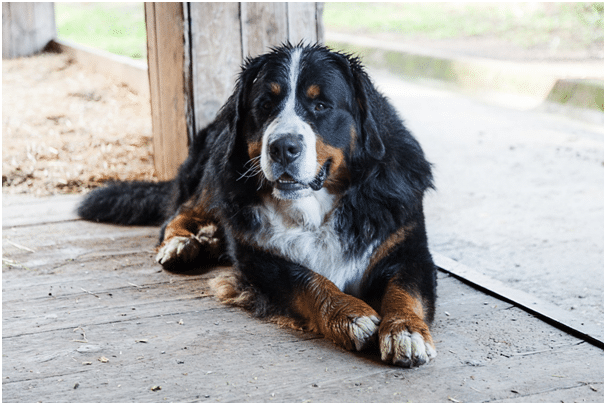
Bernese Mountain dogs are one of the most popular giant dog breeds today. Males typically weigh in at around 115 pounds (52 kg), and females average about 100 pounds (45 kg).
Height-wise, they typically stand 26-28 inches (66-71 cm) tall at the shoulder.
The St. Bernard is even larger than the Bernese Mountain dog. Males reach up to 200 pounds, and females usually weigh in at around 150 – 175 pounds.
They are also quite tall, standing 28-30 inches (71-76 cm) at the shoulder.
Like the Bernese Mountain dog, they are also one of the larger breeds of dog.
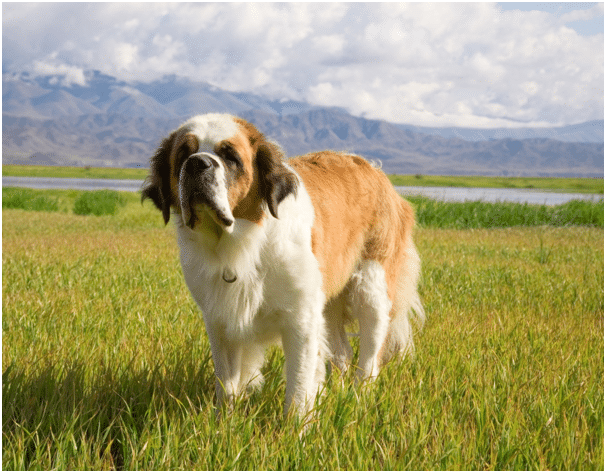
Coat Type & Color
Both the Bernese Mountain dog and St. Bernard have thick, double coats that are designed to protect them from the cold weather in their native Mountains.
The Bernese Mountain dog has a tri-colored medium-length coat, with black, white, and rust-colored markings.
The St. Bernard’s coat is long and mostly white with large patches of red or brown.
Temperament
Bernese Mountain dogs are known for being gentle, calm, and good-natured. They are loyal and affectionate with their families but can be aloof around strangers.
St. Bernards are also gentle giants, although they may be more reserved with strangers than Bernese Mountain dogs.
Known for being patient and good with children, they make ideal family pets. They can be stubborn at times but are relatively easy to train.
While both breeds are good for the family home, the Bernese Mountain dog may be better suited for families with small children, as they are typically more patient and laid-back than the St. Bernard.
Protectiveness
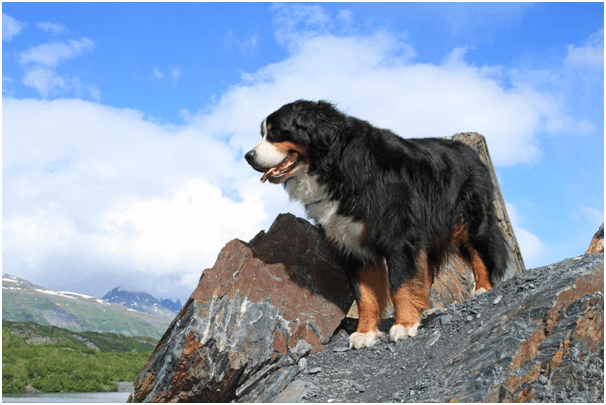
The Bernese Mountain Dog is a loyal and protective breed.
They were originally bred to be working dogs. Their loyalty and obedience made them ideal candidates for guarding property and livestock.
This natural instinct to protect has carried over into their modern day lives, and Bernese Mountain Dogs are just as protective of their families.
They are wary of strangers and will usually only approach people they know.
However, if they sense that their family is in danger, they will not hesitate to step in and defend them.
St. Bernard dogs are best known for their roles as rescue dogs in the Alps, where they would help find and save lost or injured travelers.
However, St. Bernards are also fiercely protective of their families and make excellent guard dogs.
While they are gentle giants by nature, they will not hesitate to defend their pack from any perceived threat.
In particular, St. Bernards are known for their courage in the face of danger and will often put themselves between their family and a potential attacker.
With their powerful build and deep bark, St. Bernards can be intimidating to strangers, making them an effective deterrent against crime.
In addition to their physical strength, St. Bernards also have a keen sense of smell, which they use to track down intruders on their property.
For all these reasons, St. Bernard dogs make excellent protectors for both homes and businesses.
Training
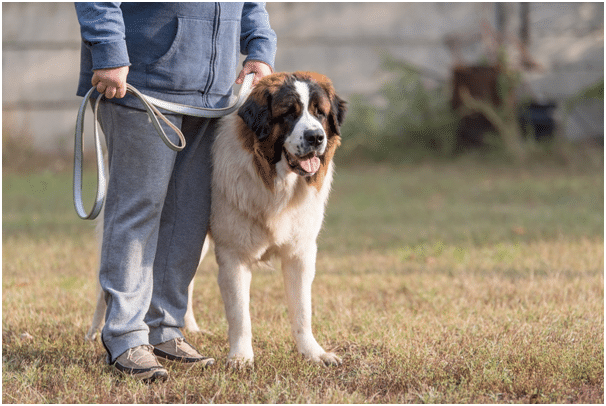
Bernese Mountain Dogs are relatively easy to train, although they do require some specific training requirements.
For example, Bernese Mountain Dogs need to be socialized early and often, as they can be shy around strangers.
In addition, they need to be taught basic obedience commands such as sit, stay, come, and down.
Due to their size and strength, Bernese Mountain Dogs also need to be trained not to pull on the leash or jump up on people.
With proper training, Bernese Mountain Dogs make wonderful companions.
St. Bernards are one of the most popular breeds of dogs and require a fair amount of training.
Puppies should start socialization training as early as possible, so they can learn to interact calmly and confidently with other people and animals.
They should also begin basic obedience training, learning commands such as sit, stay, come, and down.
St. Bernards are intelligent dogs and can learn complex tricks, but they can also be stubborn, so patience and consistency are important when training them.
Once a St. Bernard reaches adulthood, he may also need to undergo specialized training if he is going to be used for carting or rescue work.
With the right training, a St. Bernard can be a furry friend and faithful companion for many years to come.
Socialization
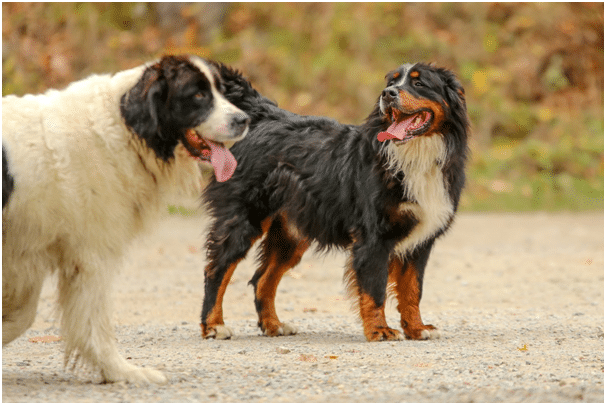
Bernese Mountain Dogs need to be socialized early and often, as they can be shy around strangers.
In order to socialize a Bernese Mountain Dog, expose him to as many different people, places, and situations as possible.
Take him for walks in different neighborhoods, introduce him to new animal friends, and have visitors over to your house on a regular basis.
The more exposure he has to different people and situations, the more comfortable he will be in new environments.
Similar to the Bernese Mountain dog, the St. Bernard should also be socialized early and often. This will help them to become well-rounded dogs that are comfortable in a variety of situations.
One way to socialize a St. Bernard is to take him to different types of places, such as the park, the beach, and hiking trails.
Another socialization method is to introduce him to different people, such as children, the elderly, and people with disabilities.
The more exposure a St. Bernard has to different people and situations, the better he will be able to cope with new experiences.
Exercise
Given the sheer size and energy level of the Bernese Mountain Dog, they need plenty of exercise to stay healthy and happy.
A minimum of 30 minutes of vigorous exercise per day is recommended, although many Bernese Mountain Dogs will enjoy even more than that.
Walking, running, fetch, and swimming are all great ways to get your dog moving.
And because Bernese Mountain Dogs are social creatures, it’s also important to provide plenty of opportunities for them to interact with other dogs and people.
Whether you’re taking them for a hike in the Mountains or just playing catch in the backyard, make sure your Bernese Mountain Dog is getting the exercise they need.
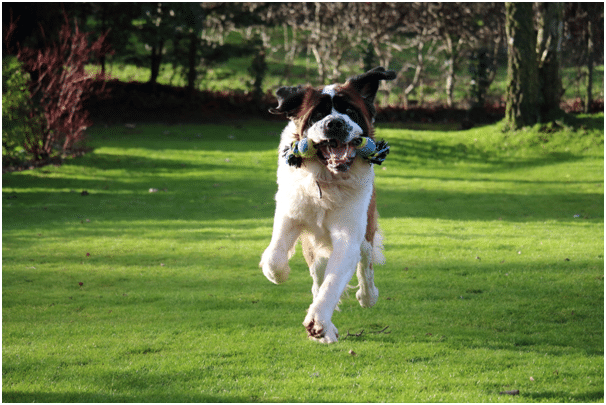
The St Bernard is one of the most iconic dogs in the world, known for its massive size and gentle nature. But despite their gentle disposition, St Bernards are still working dogs, and they need plenty of daily exercise to stay healthy and happy.
As a general rule, adult St Bernards should get at least 30 minutes of exercise per day. This can be divided into two or three shorter sessions, depending on your schedule.
If possible, take your St Bernard for a walk in the morning and evening, and give them some time to play in the yard during the day.
Whilst not the best breed for apartments, if you live in an apartment or do not have access to a yard, you may need to take your St Bernard to a dog park or doggy daycare several times a week.
Regardless of how you choose to exercise your St Bernard, the important thing is to cater to their activity levels as part of their daily routine.
Mental Stimulation
In addition to physical exercise, Bernese Mountain Dogs also need plenty of mental stimulation to stay happy and healthy.
This can be provided in a number of ways, such as through interactive toys, food puzzles, and training games.
Interactive toys are designed to keep your dog’s brain engaged, while food puzzles provide a fun and challenging way for them to get their meals.
Training games are another fantastic way to mentally stimulate your Bernese Mountain Dog.
Not only will they enjoy the challenge of learning new tricks, but they’ll also appreciate the bond that you’ll form through the training process.
Stimulating your St Bernard’s mind is just as important as exercising their body, so make sure to include plenty of mental stimulation in their daily routine.
There are a few different ways to provide mental stimulation for your St Bernard.
One way is to give them interactive toys, such as Kongs or Puzzle Toys.
These toys are designed to keep your dog’s brain engaged and can be filled with treats or food to make them even more challenging.
Another way to provide mental stimulation is through training games. St Bernards are intelligent dogs and will enjoy the challenge of learning new tricks.
Not only will they have fun, but you’ll also be able to bond with your dog during the process.
Lastly, food puzzles are a great way to mentally stimulate your St Bernard. These puzzles provide a fun and challenging way for them to get their meals.
Mental stimulation is just as important as physical exercise for St Bernards, so make sure to include it in their daily routine.
Training Needs
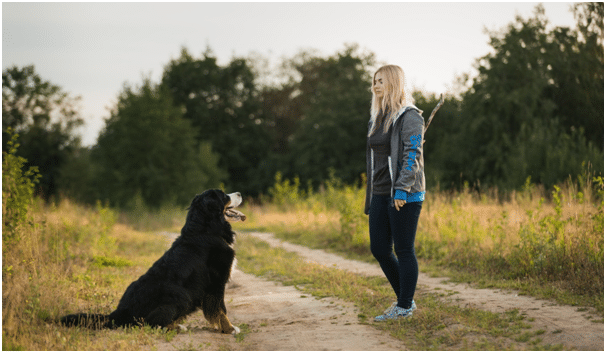
Bernese Mountain Dogs need to be trained from an early age. They are intelligent dogs that learn quickly, but they can also be stubborn.
As a result, it is important to start training early and to be consistent with commands.
Training should focus on basic obedience, but it should also include socialization with other people and animals.
With the right training, a Bernese Mountain Dog can be a loyal and affectionate companion.
Similar to the Bernese Mountain Dog, the St. Bernard is also relatively easy to train.
However, they do require some specific obedience training in order to be well-behaved members of the family.
Training Tips
Here are some tips for training a St. Bernard Dog:
1. Start early: It is important to start training your St. Bernard while they are still a puppy. This will help them to learn quickly and build good habits from an early age.
2. Be consistent: Consistency is key when training any dog, but it is especially important with a large breed like the St. Bernard.
Make sure that everyone in the family is using the same commands and rewards so that the dog doesn’t get confused.
3. Use positive reinforcement: Positive reinforcement training is one of the most effective methods for training any animal, and it should be your go-to method when training your St. Bernard Dog.
Use treats or verbal praise to reward good behavior and avoid using punishment or negative reinforcement.
4. Socialize early and often: Socialization is an important part of training for any dog, but it is especially important for a large breed like the St. Bernard.
Make sure to expose your puppy to different people, places, and animals so that they learn how to behave appropriately in a variety of situations.
Proper socialization will also reduce the risk of your dog engaging in destructive behavior.
With the proper training, your St. Bernard will likely develop a calm patient nature, and be a well-behaved and beloved member of the family.
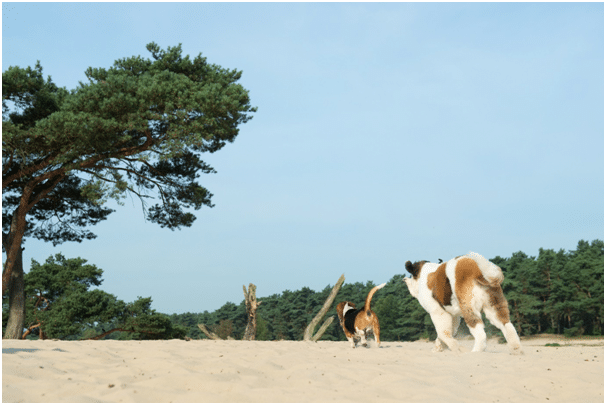
Nutrition
Bernese Mountain Dogs are a large breed of dog, and as such, have different nutritional requirements than smaller breeds.
They require a diet that is high in protein in order to maintain their lean muscle mass, and they also need plenty of nutrients to support their growing bones.
In addition, Bernese Mountain Dogs are prone to joint problems, so a diet that includes joint-supporting ingredients like glucosamine and chondroitin is important.
They are also susceptible to bloat, a condition in which the stomach twists on itself and cuts off blood flow.
For this reason, it is important to feed them several small meals throughout the day instead of one large meal.
Typical brands that are recommended for Bernese Mountain Dogs include Blue Buffalo, Merrick, and Wellness.
Overall, Bernese Mountain Dogs need a nutritionally balanced diet that meets their unique needs in order to stay healthy and active.
As one of the largest dog breeds, St Bernards need a lot of food to maintain their energy levels. However, it’s important to make sure that they are getting the right kind of nutrition in their diet.
Adult dogs should eat a diet that is high in protein and fat, with moderate levels of carbohydrates.
This helps to keep them lean and muscular. Puppies, on the other hand, need more calories and nutrients to support their rapid growth.
As a result, they should be fed a diet that is higher in protein and fat. Puppy food also has smaller kibble sizes to make it easier for them to eat.
It’s also important to consult with a veterinarian to make sure that your St Bernard is getting all the nutrients they need at every stage of their life.
Grooming
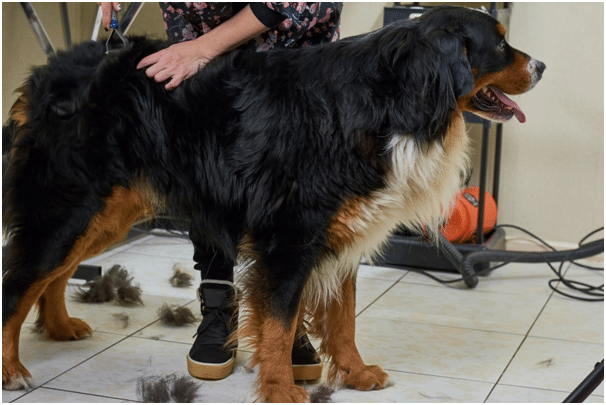
The Bernese Mountain Dog is a large and imposing breed, known for its thick coat of fur. While this coat may be striking, it also requires some special attention when it comes to grooming.
In general, Bernese Mountain Dogs should be brushed several times a week, with extra care taken during shedding season.
In addition, their nails should be trimmed regularly, and their ears should be checked for debris and cleaned as needed.
While the occasional bath is fine, over-bathing can strip the natural oils from their coat and lead to skin problems.
With some regular care, however, the Bernese Mountain Dog’s coat will stay healthy and lustrous.
The St Bernard is a large and imposing dog, with a thick coat of fur that requires regular grooming.
Left unchecked, the coat can quickly become matted and tangled, making it difficult for the dog to move freely.
In addition, the long hair around the face and ears can obscure the dog’s vision and make it more difficult to hear commands.
As a result, it’s important to brush the coat weekly, using a slicker brush or comb to remove any knots or tangles.
The hair around the face and ears should be trimmed regularly, and the nails should be trimmed every few weeks.
By taking care to groom your St Bernard regularly, you can help keep them healthy and happy.
Drooling Potential
Bernese Mountain dogs are loyal and gentle animals that make great family pets. One downside of the breed, however, is their tendency to drool.
Bernese Mountain Dogs have large, loose lips that allow drool to escape easily, and they often Drool when they are excited or nervous.
While some people find this charming, others may find it to be a nuisance. If you are considering getting a Bernese Mountain Dog, it is important to be prepared for some drooling.
However, with proper care and training, you can help keep your dog’s drooling under control.
St. Bernards are notorious for their drooling, which can be quite excessive at times.
While most dogs only produce a small amount of saliva, St. Bernards can produce up to three times as much.
This is because they have extremely long tongues, which contribute to their drooling habits.
In addition, St. Bernards have a very deep chest, which also contributes to their drooling by causing the saliva to pool in their mouths.
While some people find this drooling to be quite bothersome, it is a very natural and normal behavior for these dogs.
Barking Levels
While Bernese Mountain dogs are not known as particularly vocal dogs, they will bark when they feel it is necessary.
For example, they may bark to warn their owner of potential danger or to let them know that someone is approaching the house.
They may also bark when they are playing or when they want attention.
In general, Bernese Mountain Dogs are not excessive barkers, but their owners should still be aware of their potential to make noise.
St. Bernards are known for their loyalty, intelligence, and of course, their deep, booming bark.
While every St. Bernard has its own unique personality, they all share a tendency to be vocal dogs.
Some may only bark when they’re excited or want attention, while others may be more prone to barking out of fear or anxiety.
However, with proper training and socialization, most St. Bernards can learn to control their barking.
In general, these friendly dogs make great companions and are relatively easy to live with – as long as you don’t mind a little noise now and then.
Hot weather tolerance
Bernese Mountain Dogs are reasonably tolerant of hot weather, although they are more susceptible to heat stroke than some other breeds.
They do best in moderate climates with moderate humidity levels.
During the summer months, it is important to provide them with plenty of shade and fresh water.
Avoid exercising them during the hottest part of the day, and never leave them in a car or other enclosed space without air conditioning.
If you must take them out in the heat, be sure to monitor them closely for signs of overheating, such as excessive panting or drooling.
If you suspect your dog is overheating, immediately move them to a cool area and seek veterinary care.
With proper care and precautions, Bernese Mountain Dogs can enjoy a comfortable life in almost any climate.

St. Bernard dogs are known for their thick fur coats, which can make them uncomfortable in hot weather.
However, they are actually quite tolerant of warm temperatures and can often be seen taking a nap in the sun.
While they may not be able to stay out in the heat for extended periods of time, they are generally able to tolerate short periods of exposure without any problems.
Having said that, St. Bernards are prone to heat stroke, so it is important to keep an eye on them for signs of over-heating such as excessive panting or drooling.
If you notice any of these signs, immediately move your dog to a cooler location and provide them with water.
With proper care, St. Bernards can enjoy a comfortable life in even the hottest climates.
Cold weather tolerance
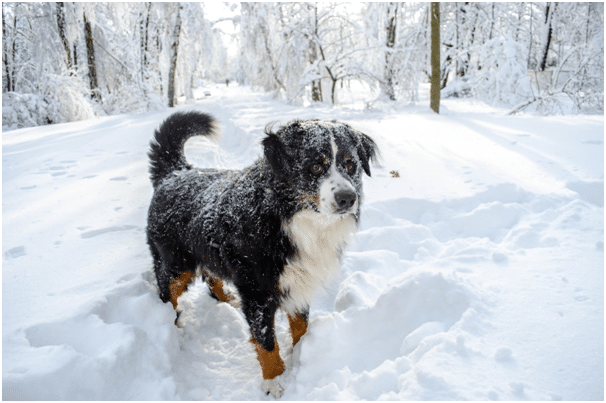
The Bernese Mountain Dog is a large, rugged breed that was originally developed in the Swiss Mountains.
Bred to withstand cold weather and rough terrain, the Bernese Mountain Dog is well-suited to life in cooler climates.
Though they are not excessively prone to cold weather problems, they can be susceptible to joint stiffness and discomfort in colder temperatures.
For this reason, it is important to make sure that your Bernese Mountain Dog has access to a warm, dry shelter when the temperature starts to drop.
Additionally, you should take care to avoid exposing your dog to extreme cold or wet conditions, as this can exacerbate any existing health problems.
With proper care and consideration for their needs, Bernese Mountain Dogs can enjoy a long and healthy life in even the coldest climates.
Thanks to their double coats, St Bernards are relatively tolerant of cold temperatures.
The outer coat is long and coarse, while the inner coat is dense and soft. This combination helps to insulate the body and protect against the elements.
In addition, the St Bernard has a high body fat percentage, which further helps to keep them warm in winter.
However, it is important to note that the St Bernard is not invincible to cold weather.
While they can tolerate colder temperatures than most dog breeds, they still need access to shelter and should not be left outdoors for extended periods of time in extremely cold weather.
Good with Other Dogs?
Bernese Mountain Dogs are a large, gentle breed that is known for being good with children and other animals.
Berners tend to be very friendly with other dogs, and they generally enjoy spending time in the company of other canine companions.
However, they may be a bit too hearty for smaller pets.
It is also important to introduce them to new dogs gradually, as they can be overwhelmed by too much excitement at once.
Additionally, Bernese Mountain Dogs need plenty of exercise and socialization, so it is important to make sure that they have opportunities to meet other dogs on a regular basis.
With proper care and socialization, Bernese Mountain Dogs can make wonderful companion animals for both people and other dogs.
St. Bernards are large, gentle dogs that are known for their calm and friendly dispositions.
Similar to the Bernese Mountain dog, the St. Bernard is generally good-natured and playful with other dogs.
However, because of their size, they may unintentionally come across as too rough.
It is important to socialize them early on and to supervise interactions with smaller dogs, to prevent any accidents.
With proper training and guidance, St. Bernards can get along well with other dogs, both big and small.
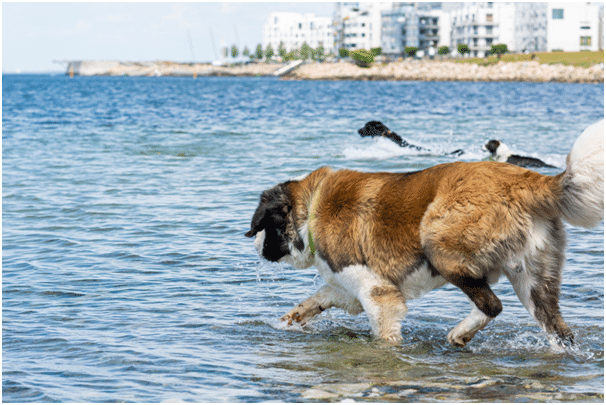
Good with Children?
Bernese Mountain Dogs are a large breed of dog, and as such, they can be intimidating to small children.
However, they are incredibly gentle and patient dogs, which makes them great companions for families with young kids, along with elderly people.
Bernese Mountain Dogs are loyal and protective of their family, but they are also gentle and loving.
They enjoy being around people and are quick to make new friends. If you have young children and are looking for a family dog, a Bernese Mountain Dog is an excellent choice.
They will quickly become a big part of your family and will provide years of love and companionship.
St. Bernards are gentle giants who love nothing more than spending time with their families.
They are loyal and protective, and they have a deep basin of patience when it comes to dealing with children. They make great dogs for kids of all ages.
St. Bernards are well-known as great companion dogs. In fact, they are often used as therapy dogs due to their calm and comforting nature.
However, it is important to remember that all dogs are individuals. Some may be better suited to life with children than others.
When choosing a St. Bernard, it is important to meet the dog in person to see if there is a good match.
With the right family, this breed can be a devoted companion for life.
Intelligence levels Compared
Studies show that Bernese Mountain Dogs are indeed intelligent. They rank in the top 20% of all breeds in terms of cognitive ability.
This means that they are quick learners, and they excel at tasks that require problem-solving skills.
In addition, Bernese Mountain Dogs have a strong memory, and they are good at following commands.
So, if you’re looking for a smart and obedient companion, a Bernese Mountain Dog may be the perfect choice.
Studies show that St. Bernards are not the most intelligent dogs, ranking 123rd out of 138.
However, they are still considered fairly smart. They are good at problem-solving and have been known to be helpful in emergencies.
Known as “Nanny dogs”, St Bernards are often used as therapy dogs because of their gentle nature and their ability to respond to human cues.
Though they are not the easiest dogs to train, with patience and consistency, they can learn tricks and commands.
Overall, St. Bernards are loyal, gentle giants that make great companions.
Health Issues Compared
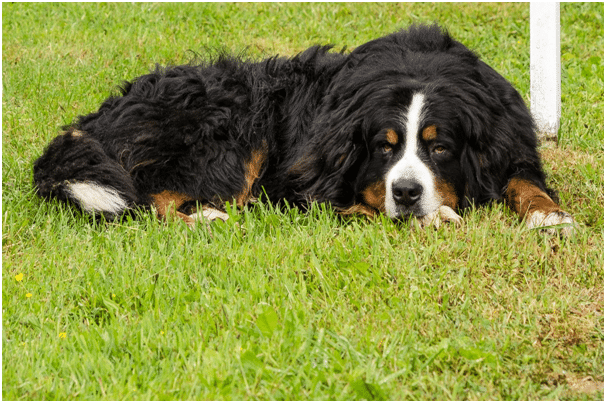
Bernese Mountain Dogs
One of the most common health concerns faced by Bernese Mountain Dogs is joint dysplasia, including elbow and hip dysplasia.
This is a condition that leads to joint pain and mobility problems. Other health issues that have been reported in Bernese Mountain Dogs include cancer and bloat.
While these health conditions can be serious, it is important to remember that Bernese Mountain Dogs are still relatively rare, so there is not a large amount of data on their health.
As more information becomes available, it is likely that the health problems faced by Bernese Mountain Dogs will be better understood.
St. Bernard Dogs
Studies show that St. Bernard dogs have a variety of health issues. The most common problems include Hip dysplasia, elbow dysplasia, von Willebrand’s disease, and diabetes.
However, there are several other health problems that have been documented in St. Bernard dogs. These include cancer, epilepsy, and heart disease.
While the majority of these health problems can be managed with proper veterinary care, they can still take a toll on the dog’s quality of life.
As a result, potential owners should be aware of the risks before they decide to bring a St. Bernard dog into their home.
Life Expectancy Compared
Bernese Mountain Dogs have a life expectancy of 8 to 10 years. Although some studies have shown that they may live even longer.
The key to a long and healthy life for Bernese Mountain Dogs is good nutrition and regular exercise.
Boredom can also be a health hazard for this breed, so it’s important to keep them mentally stimulated with toys, training, and plenty of attention.
With proper care, Bernese Mountain Dogs can be loving companions for many years to come.
Studies show that the average life expectancy of a St Bernard Dog is between 8 and 10 years.
However, there are many factors that can affect a dog’s lifespan, such as diet, exercise, and genetics.
For example, studies have shown that dogs who are fed a high-quality diet and get regular exercise tend to live longer than those who do not.
In addition, some breeds of dogs, such as the St Bernard, are predisposed to certain health conditions that can shorten their lifespan.
However, with proper care and nutrition, many St Bernard Dogs can enjoy a long and healthy life.
Dog Prices Compared
The average cost to purchase a Bernese Mountain Dog is between $1,500 and $2,500.
However, prices can vary significantly depending on factors such as the breeder’s reputation, the dog’s parentage, and whether the dog has been spayed or neutered.
In general, females tend to be more expensive than males, and purebreds are typically more costly than mixed breeds.
Some breeders also offer discounts for buyers who are willing to take on an older dog or one with special needs.
Ultimately, potential dog owners should do proper research. This includes finding a breeder that offers Bernese Mountain Dogs at a price they are comfortable with.
The cost of purchasing a St Bernard Dog varies depending on several factors, including the breeder, the dog’s lineage, and whether or not the dog has been trained.
Generally speaking, however, most St Bernard Dogs cost between $1,000 and $3,000.
Some breeders may charge more for dogs with champion lineage. Whereas others may offer discounts for puppies that have been obedience or agility trained.
It is important to do your research before purchasing a St Bernard Dog. You want to make sure you are getting a healthy, well-behaved animal.
Whether its the Bernese Mountain dog or St Bernard, be prepared to pay between $1,000 and $3,000 for your new furry friend.
What is the best family dog?
Some families may prefer the laid-back nature of the Bernese Mountain Dog, while others may prefer the high energy of the St Bernard Dog.
It is important to choose a breed that will fit well with your family’s lifestyle and personality.
Factors such as the age of young children in the home, to other pets in the household, should all be considered when choosing a family dog.
Ultimately, the best family dog is the one that will fit in well with your specific circumstances.
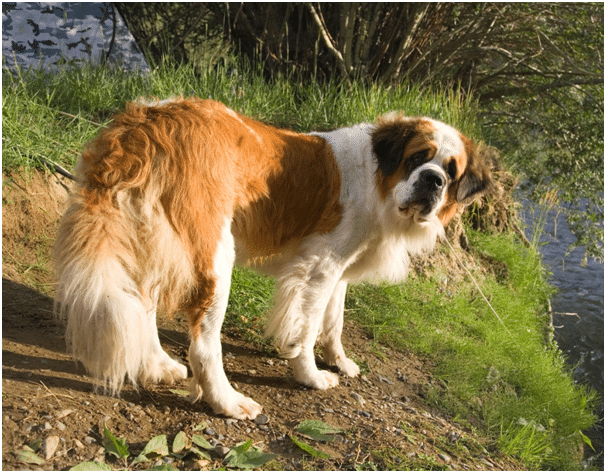
Final Thoughts
When choosing between a Bernese Mountain Dog and a St Bernard Dog, there are many factors to consider.
Cost, life expectancy, and temperament are just a few of the things you’ll need to consider.
Weighing all these factors will help you make the best decision for your family. We hope this detailed guide assists you in making an informed decision on the breed of choice that suits you best.


